Koalas' Food Eucalyptus has Lower Nutritional
The Eucalyptus leaves have very lower nutritional value for koalas. In fact; the Eucalyptus leaves have no nutritional value what so ever for koalas and it is just a miracle that an animal like koala can live by eating it during its entire lifespan. First of all, the Eucalyptus leaves are indigestible but somehow koalas can digest them. Secondly; the Eucalyptus leaves contain phenols which are known to kill animals. Third; the Eucalyptus leaves have little or no energy for any animal to fulfill day to day energy requirements of koalas.
Even though the eucalyptus leaves have lower nutritional value for koalas yet still they survive by eating it during their entire lifespan.
Surprisingly; koalas avoid all these negatives of eucalyptus and somehow survive on the Eucalyptus diet throughout their entire lifespan. This article highlights and measures the nutritional value of the Eucalyptus leaves for koalas and reveals the ability of koalas to live a life out of Eucalyptus against all limitations.
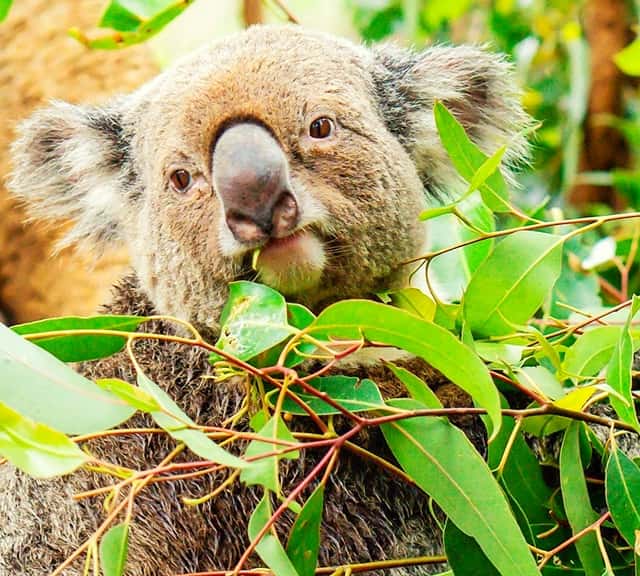
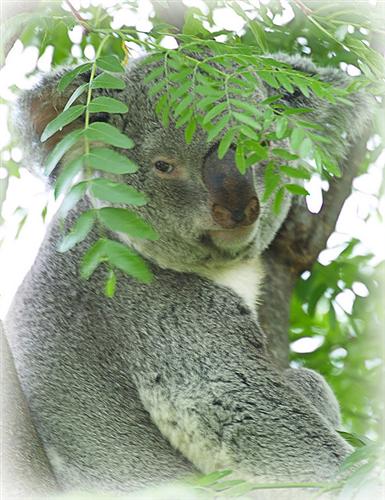
The Eucalyptus leaves contain water, fiber, tannins, phenolics, starch, sugars, Lipid and proteins etc. The best part about the Eucalyptus leaves is that they are 55 percent water which is one of the highest concentrations of water content among various species of plants with leaves.
On the positive side, the Eucalyptus leaves are 55 percent water which 100 percent fulfill the water requirements of koalas.
This presence of 55 percent concentration of water compound within the Eucalyptus leaves 100 percent fulfill the thirst requirements of koalas and koalas don't even need to drink water from the water holes. Even the word koala also means “No Water” because the aboriginal Australian people used to believe that the animal never drinks water.
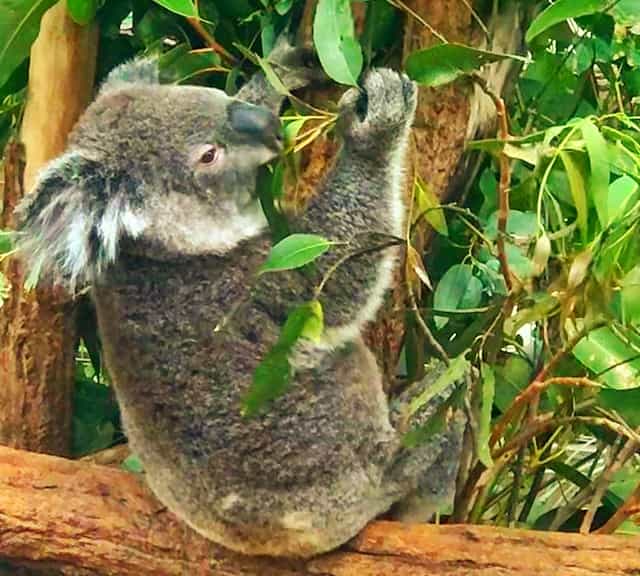
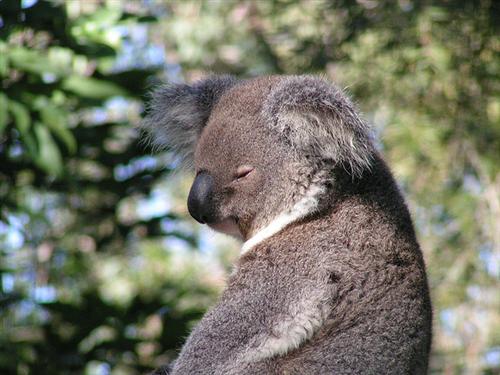
The Eucalyptus leaves also contain high concentrations of fiber for koalas. Fiber comprises of 15 percent of the total Eucalyptus leaf contents. It is believed that the fiber within the Eucalyptus leaves is 6 times more than a normal muesli bread. However; the Eucalyptus fiber for koalas contains much lesser amount of energy as compared to the muesli bread.
The Eucalyptus leaves have higher concentrates of fiber which quickly fill the koalas' stomach but offer little amount of food energy for them.
Another draw back of higher fiber contents within the Eucalyptus leaves is that they quickly fill the stomach of koalas. Therefore; koalas can't eat the Eucalyptus leaves in large quantities. Even worst; the digestion of this higher lignified fiber content is rather time consuming and difficult to digest.
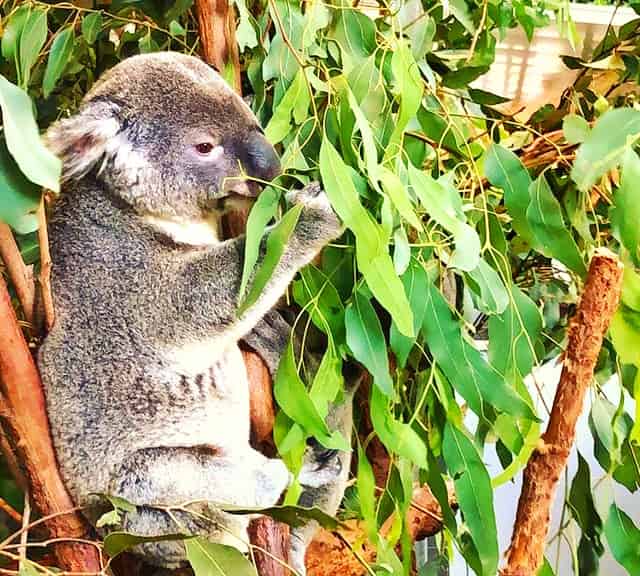
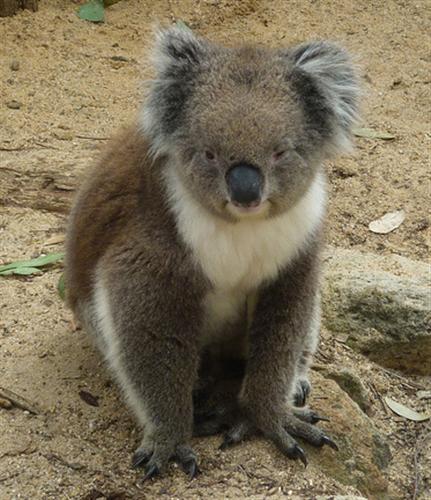
The third key component within Eucalyptus leaves for koalas includes carbohydrates. Carbohydrates constitute about 7% of the total leaf contents within Eucalyptus. Carbohydrates are considered as the first source of energy to the body. The Eucalyptus carbohydrates include starch and sugar. When koalas eat the Eucalyptus leaves, they absorb most of the starch and sugar contents within their stomach.
Eucalyptus leaves comprise of about 7% of carbohydrates in the form of starch and sugar. This quantity is very low to produce significant amount of energy for koalas.
However; this absorption process is relatively slow because the koalas' diet comprises of high concentrates of fiber which slow down the transfer of the sugar into their bloodstream. Lastly; 7% starch and sugar contents are extremely low and they produce very little amount of energy for koalas. Even worst; koalas can't intake more carbohydrates by eating more large quantities of Eucalyptus leaves because of high fiber contents.
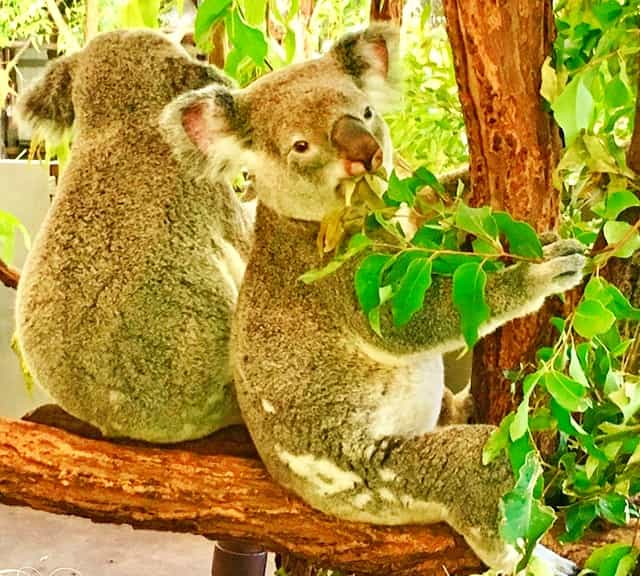
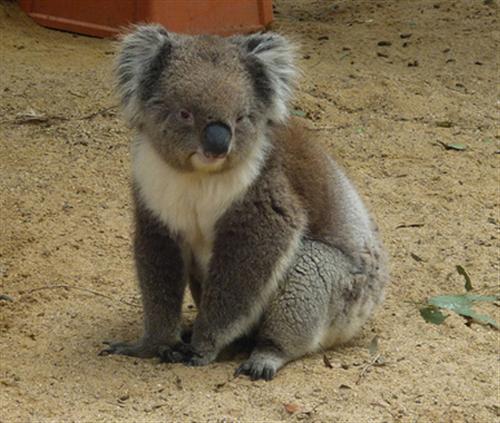
The Eucalyptus leaves also contain 13 percent of tannins and phenols. Tannins are known to decrease the food efficiency and net energy through metabolism. They also decrease the digestibility and food efficiency as well. On the other hand; phenols are not known either to produce any body energy but rather they are considered highly toxic for the cells.
The Eucalyptus leaves comprise of 13 percent of tannins and phenols which are not responsible for any nutritional value or body energy either.
Therefore; the presence of phenols and tannins (13 %) within the Eucalyptus leaves are not the encouraging signs of nutritional value for koalas either. Similarly; the presence of strong scented oils is quite also dominant within the Eucalyptus leaves and these oils are known to become cyanide compounds during the metabolic conversion.
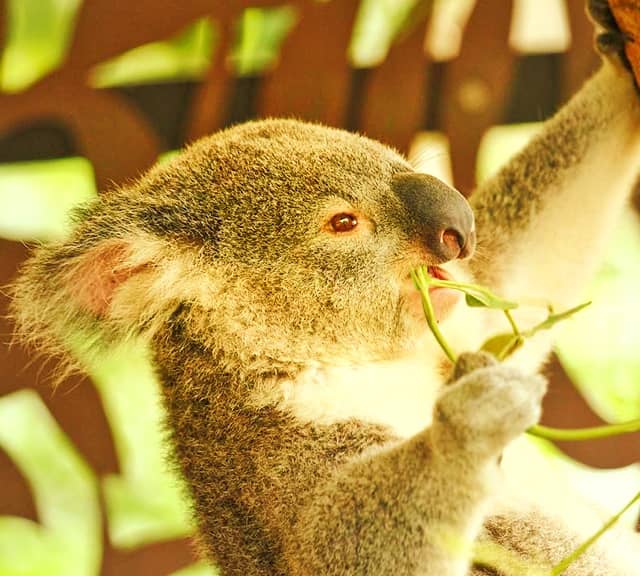
Lastly; the Eucalyptus leaves contain 6 percent lipids (fatty acids) and 4 percent protein. Lipids and proteins are known to provide reasonable and necessary nutritional value to the body of an organism. Furthermore; lipids and proteins are responsible for tissue development within organisms. However; just the 6% concentration of lipids and 4% concentration of proteins are very low to provide energy and nutritional value to any animal including koalas.
Eucalyptus leaves contain just 6% fats and 4% proteins which are not enough to fulfill the energy and nutritional requirements of any animal. Somehow koalas live on them by adopting a sluggish and sleepy lifestyle.
However; koalas live on this meager nutritional value by lowering their body metabolism, adopting sluggish & sloth-like lifestyle and sleeping for more than 20 hours per day. This allows koalas to conserve their body energy and live on a diet that contains lower amount of energy and lower nutritional value.
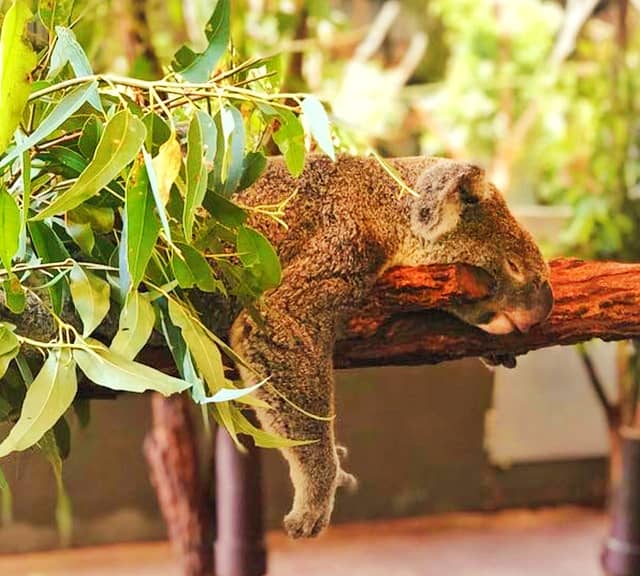
Liger Articles
Marsupials vs. Placental Mammals
Koalas are most popular animals in Australia
Koalas are more popular as compared to Kangaroos
Koalas and their Dominant Nose
Button Shaped Fascinating Eyes of the Koalas
Core Recognizing Features of Koalas
Koalas are the largest tree climbing Mammals in Australia - Koalas as Arboreal
Sizes of Koalas from Queensland, Australia
Sizes of Koalas from Australia's Victorian Origin
Difference between Queensland and Victorian Koalas
Average Weights of Male Koalas
Weighing Male vs Female Koalas
Male Koalas have Loudest of voice among all Australian Mammals
Origin of Koalas & their Evolution
Koalas Population Increased at the end of 20th century
Historical Evolution of the Koalas - A Physical Perspective
Koalas and their Aboriginal and Native Names
It Took 10 years for Aboriginal Australians to Spot and Recognize Koalas
Koalas Live Hardest and Toughest Lives Among all animals
Koalas Tooth Decay through its Abrasive Diet
Koalas Diet is Fully Poisonous and Toxic
Koalas' Food Eucalyptus has Lower Nutrition
Koalas have Lower Energy Levels
Koalas - When Occasionally Spotted on other Leaves for their Food
Why Koalas drink little or no Water?
Koalas & their Advanced Digestive Mechanisms
Why Koalas Sleep more than 20 Hours a Day?
Koalas Lack Energy and Strength
Koala's Tooth from Growth till Tooth Decay
Young Koalas are Better Chewers as Compared to Mature and Elderly Koalas
Why Most Koalas Die of Starvation?
Heat Exhaustion and Heat Strokes among Koalas
Do Koalas lack Intellectual Abilities?
Koalas and their Sense of Smell
Koalas Love Fresh Eucalyptus Leaves as their Food
Koalas' Eucalyptus Leaves' Preferences during summers and Winters
Koalas' Preference for Leaves Having Higher Nitrogen Levels
Koalas Prefer Big Eucalyptus Trees and Love to Stay at Trees' tops.
Koalas Prefer to Live in Areas that have Good Soil and Fertile Lands
Koalas' Per Day Food Consumption
Koalas Food Consumption Depends upon their Body Size
Lactating Female Koalas Consume More Food as Compared to the Normal Female Koalas
Koalas Consume More Food during Winters as Compared to Summers
Female Koalas are very Selective Regarding their Leaf Selection and Food Consumption.
A Baby Koala Joey Lives in her Mother's Pouch for 8 to 9 Months
Gestation Period within Female Koalas
Breeding Behaviors of the Female Koalas
The Size of the Baby Koala Joey at the time of its Birth
Weight of the Baby Koala Joey at the Time of its Birth
At Birth the Baby Koala Joey Travels from Cloaca into their Mother's Pouch
Newborn Koala Joeys have Well-Established Sense of Smell
Koala Joey keeps his Head Inside its Mother's Pouch for 6 Months
Complete Shape and Body Development of the Koala Joey
Pap - The first solid food of the Koala Joeys
When Does Tooth Emerge for Baby Koala Joey?
Aggressive Behavior of Mother Koalas towards their Joeys
Queensland Offers Less Nutritional Values for Koalas
How long does Koalas live? Age of the Koala
Female Koalas Live More than Male Koalas
What is the Average Age of the Male Koala?
Average Ages of the Female Koalas
For How Long a Female Koala can Give Birth to the Koala Joeys?
How many times female Koalas give birth?
Koalas and Australia's Bushfire
Koalas' fur quickly gets rid of rain water
Koalas Resting and Sleeping Postures and Positions during the Hot Summer Seasons
Winter Season and Sleeping Postures of Koalas
Koalas' Urination during Summer and Winter Seasons
Koalas and their Specialized Claws
How does a Koala regulate its Body Temperature?
Food Consumption and Feeding Timings of the Koalas
Koalas Always Prefer Eucalyptus Leaves from the Tree top
How does a Koala Grooms itself?
Koalas' Territories and ranges within Australia's Victorian Areas
Koalas' Territories and Ranges within Australia's Queensland Areas
Behavior of the Alpha Dominant Male Koala
Aggressiveness of Female Koalas
Scent Marking Behavior of the Male Koalas
Mating Strategy of the Male Koalas
Fights and Territorial Encounters of Male Koalas
Sounds and Vocalizations of Male Koalas
Sounds and Vocalization of the Female Koalas
Koalas and their Facial Expressions
Breeding Ages of the Male and Female Koalas
Factors Influencing the Success of Koalas' Fertility Rates
Behavior of the young and adolescent Koala Joey
When Does a Mother Koala Says Goodbye and Leaves the Young Koala Joey?
Playful Behavior of the Young Koala Joeys
Koalas - Mating Season and Mating Months
Koala Informationen, Bilder, Neuigkeit, und Erforschung
Коала - сумчатый млекопитающий